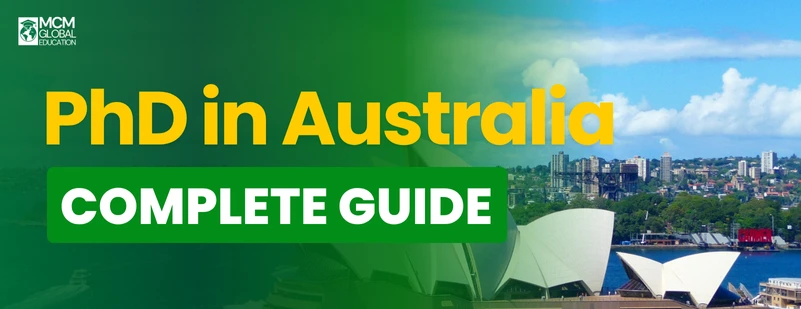Australia is fast becoming a top destination for doctoral research, attracting thousands of international students each year with its world-class institutions, cutting-edge facilities, and abundant funding options. If you’re considering pursuing a Doctor of Philosophy (PhD) in Australia, you’re looking at a pathway filled with academic growth, global collaborations, and promising career prospects. This comprehensive guide will walk you through everything you need to know about undertaking a PhD in Australia in 2025.
Table of Contents
Why Choose Australia for a PhD?
1. Prestigious Research Institutions: Australia boasts globally ranked universities, including several in the top 100, such as the University of Melbourne, Australian National University (ANU), University of Sydney, and University of Queensland. Many of these are part of the Group of Eight (Go8), known for their intensive research output and international partnerships.
2. Diverse Research Strengths: Whether your interest lies in engineering, health sciences, artificial intelligence, environmental studies, or the humanities, Australian universities offer robust doctoral programs supported by well-funded research centers.
3. Supportive Research Culture: Australia encourages international collaboration and interdisciplinary research. Many programs are supported by grants from the Australian Research Council (ARC) and industry partners, enhancing the scope and impact of your research.
4. Post-PhD Opportunities: PhD graduates can pursue careers in academia, corporate R&D, policy-making, or entrepreneurship. Australia also offers post-study work visas and migration pathways that make staying in the country easier.
Eligibility & Admission Requirements
Academic Qualifications
Most universities require applicants to have:
- A Master’s degree with a significant research component, or
- A First or Upper Second-Class Honours Bachelor’s degree.
English Language Proficiency
Non-native English speakers must typically submit:
- IELTS score of 6.5 to 7.0
- TOEFL or PTE equivalents
Research Proposal & Supervisor
Many universities require you to identify and secure a potential supervisor before applying. Your research proposal must align with the supervisor’s expertise and the institution’s research priorities.
Required Documents
- Academic transcripts
- Updated CV/Resume
- Statement of Purpose (SOP)
- Letters of Recommendation (LORs)
- Research proposal
PhD in Australia: Application Process
- Identify Your Research Area & Institution: Match your interests with faculty expertise.
- Contact Potential Supervisors: Initiate discussions with your CV and proposal.
- Prepare Documents: Gather transcripts, language test scores, and recommendation letters.
- Submit Online Application: Check specific university deadlines, often 6-12 months before intake.
- Apply for Scholarships: Many scholarship deadlines run parallel to admission deadlines.
- Receive Offer & Apply for Visa: Accept your offer, arrange health insurance (OSHC), and apply for a Subclass 500 Student Visa.
Funding & Financial Planning
Scholarships and Stipends
- Research Training Program (RTP): Government-funded; covers tuition + living allowance (~AUD 34,000/year)
- University-Specific Scholarships: Offered by individual institutions like the University of Sydney or Monash University
- External Grants: Australia Awards, Commonwealth, Endeavour scholarships
Estimated Costs
- Tuition Fees: AUD 28,000–45,000 per year (if not covered by scholarships)
- Living Expenses: AUD 21,000–28,000/year (depending on location and lifestyle)
- OSHC: ~AUD 500–700/year
- Research Costs: Equipment, travel, software (~AUD 1,000–10,000/year)
Financial Challenges
While scholarships help, many stipends are modest compared to living costs. Students sometimes rely on part-time jobs or shared accommodations to manage expenses.
Life as a PhD Student in Australia
Accommodation Options
- Homestays: ~AUD 370/week
- On-Campus Housing: ~AUD 487/week
- Shared Private Rentals: ~AUD 243/week
Work Rights
International students on a Subclass 500 visa can work up to 48 hours per fortnight during semesters and unlimited hours during breaks.
Student Support Services
Universities provide orientation programs, writing workshops, mental health services, and networking events to support student wellbeing and academic success.
Challenges & Considerations
- Financial Pressure: Living on a PhD stipend can be tight, especially in cities like Sydney or Melbourne.
- Visa Delays: Some students report long processing times; early application is crucial.
- Dependence on International Fees: Rising concerns about sustainability and equity in university funding models.
Conclusion & Recommendations
Pursuing a PhD in Australia is a rewarding yet demanding journey. It offers international exposure, research excellence, and potential migration opportunities. To succeed:
- Start Early: Contact supervisors and apply for scholarships well in advance.
- Be Financially Prepared: Understand the full cost and budget wisely.
- Stay Informed: Follow visa regulations and university policies.
- Use Available Resources: From university support to external mentorships, take full advantage.
Australia offers the right environment for driven researchers. With careful planning and dedication, a PhD from an Australian university can be your gateway to a fulfilling global career.























